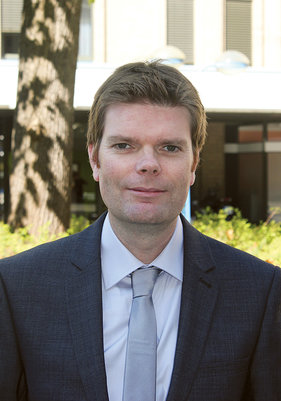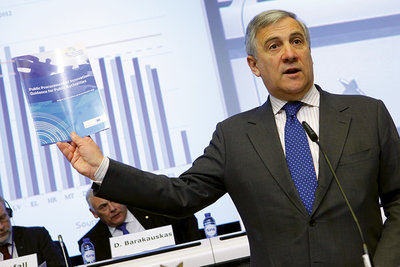
ICLEI unveils new tools for procurement of innovation
08 December 2014
by Richard Forster
Public procurement of innovation offers local governments a way to make better use of allocated funding. Mark Hidson, Deputy Regional Director and Global Director of the Sustainable Procurement Capacity Centre at ICLEI, explains how procurement can be a key tool for growth if administrators opt for sustainable and innovative products or services rather than simply the lowest price
With the financial crisis lurching into its fifth year, the struggle to find an economic panacea for Europe’s woes continues and at the local level, cities are still operating with greatly curtailed budgets, impacting their ability to deliver much-needed services.
Obscured in the debate on potential remedies–largely confined to austerity versus stimulus–has been the potential of innovative and sustainable public procurement. One of the most compelling arguments related to the benefits of innovative and sustainable public procurement is that it operates within budgetary parameters–it is not additional money being assigned, but rather a better allocation of existing funds.
The total value of public procurement in the EU is estimated at €2 trillion per year–or about 19 percent of European GDP. Directed in the right way, this figure represents tremendous fiscal power to shape societies for the better. Channelling this sum towards exclusively sustainable, ethical, and innovative products and services will have a hugely significant impact on job creation and environmental and social welfare.
So why aren’t European authorities fully harnessing the power of public procurement?
Reasons range from a lack of knowledge to a rigid fixation on ‘lowest purchase price’ rather than lowest lifetime cost.
In a bid to move past this, European leaders instigated a revision of the Procurement Directives, releasing the updated iterations earlier this year. Among the stated objectives of the reform was to facilitate strategic procurement, taking account of environmental, social and innovation factors. Another was to provide more flexibility in procedures and timelines, complemented by greater use of e-procurement.
Although some opportunities have been missed during the process, overall the reforms make it easier for public procurers to engage in sustainable and innovative public procurement.

Procurement of innovation
Innovation is a key driver for business competitiveness and job creation, and the procurement of innovative goods and services is growing in importance. It is essential, therefore, that more governmental bodies create a culture of fostering innovation.
The traditional approach to procurement is to define in detail the goods or services that the purchasing authority wants. Businesses then compete to see who can offer the service at the lowest price.
Innovative procurement turns this formula on its head. Its major difference is its ambiguity–instead of specifications, the purchasing authority lays out a need to be met (for example, a constant office temperature of 22°C), leaving it up to the tenderer to propose a creative solution–a so-called ‘output-’ or ‘performance-based specification’. Results to date have been encouraging (see example in box).
To improve the uptake of Public Procurement of Innovation (PPI), and expel the uncertainty that exists among public sector procurers on how to incorporate innovation in procurement practice, ICLEI – Local Governments for Sustainability, the global association of cities and municipalities, has developed a number of tools and resources aimed at cities.
ICLEI’s work in the field includes the development of the Procurement of Innovation Platform, an online PPI hub created with support from the European Commission, and in partnership with PIANOo–the Dutch Public Procurement Expertise Centre, REC– the Regional Environmental Center for Central and Eastern Europe, and IWT– the Flemish Agency for Innovation by Science and Technology.
Aimed at public authorities, procurers, policy makers, researchers and other stakeholders, the platform is comprised of three elements: a website, a Procurement Forum, and a Resource Centre.
Procuring innovation: distance learning via robotics
Through a competitive dialogue, Région Rhône Alpes in France sought a solution for sick high school students whose illness prevented them from attending classes. During the procurement, end-users were involved through a co-innovation scenario process and the contract was awarded to AWABOT, an SME from Villeurbanne near Lyon, which came up with an e-learning solution allowing students to communicate with teachers and friends remotely through robotics.
“The co-innovation scenario process is particularly well-suited to SMEs,” explains Isabelle Besson, Chargée de mission numérique, Région Rhône Alpes. “It takes the form of collaborative workshops on observing practices, creativity and analysis, with multidisciplinary working groups involving local government, designers, companies, clusters and users.” From the procurement which was worth €490,000, AWABOT was able to create five additional jobs. “Given the economic context, public procurement is clearly a way of achieving public service efficiency and promoting companies’ development,” says Besson. “The future of purchasing trends toward innovation should help curb public spending, while maintaining the quality of public services expected by our citizens, in a sustainable, responsible and ethical way.”

The Procurement Forum is a specially designed networking tool with currently over 1,600 members. It is a space for procurers and related stakeholders to discuss, share and connect. The Resource Centre provides a centralised database for PPI guidance, gathering useful documents in one place. At present over 600 resources are available, including national and European policy and strategy documents, tools, case studies, details of projects and initiatives, as well as reports and valuable links on innovation and procurement. “In a time of decreasing public budgets, innovation can facilitate the delivery of vital infrastructure and services,” said Antonio Tajani, Vice- President of the European Commission, at the launch of the PPI guide, which features on the website. “It is of the utmost importance, therefore, that public procurers can effectively engage in PPI.”
While innovative and Pre-Commercial Procurement may be the newest area of focus for the European Union and Member States, ICLEI has also been providing guidance and encouragement to cities on a more well-established, and very closely linked, approach to procurement for over a decade through Sustainable Public Procurement (SPP).
Sustainable procurement means ensuring that the products and services an organisation buys achieve value for money and generate benefits not only for the organisation, but also
for the environment, society and the economy. At its most basic, sustainable procurement can mean buying energy efficient computers or fair trade coffee.
Undertaken correctly, sustainable procurement has the capacity to stimulate new technology, achieve more efficient public services, create jobs and provide solutions that reduce environmental impacts and are socially responsible. With public procurement accounting for a significant proportion of global spending, ensuring sustainability is embedded in procurement processes can have a positive impact on communities worldwide.
One of ICLEI’s primary tools for informing city-level procurers of sustainable methods and best practice is the Sustainable Procurement Resource Centre. The online resource contains key knowledge on how to effectively undertake sustainable procurement, saving public authorities money and driving the market towards sustainable solutions.
Through its work with cities, ICLEI is helping public authorities to use procurement as a tool to meet today’s most pressing economic, social and environmental challenges. With sufficient support, European leaders can play their part in procuring a more prosperous, just and green future.











